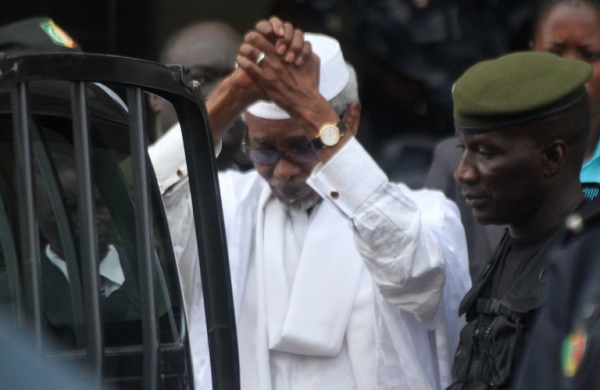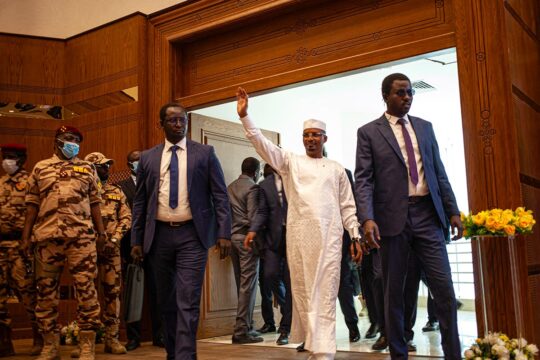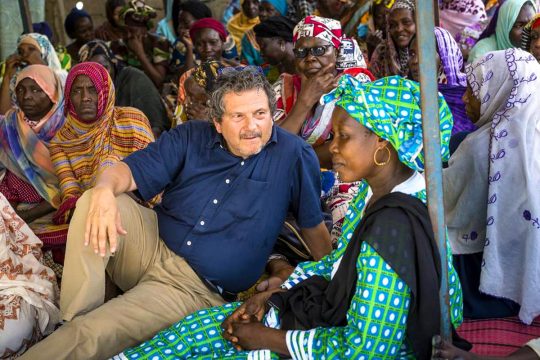Will former Chadian president Hissène Habré, exiled in Senegal since his overthrow in 1990, finally break his silence? Will he attend his own trial, due to start on Monday July 20 before the Extraordinary African Chambers (EAC) in Dakar? Or will his lawyers be forced to represent him against his will? These three questions are on everyone’s lips as they await the historic opening of his trial.
The EAC were set up in 2013 within the Senegalese justice system under an agreement between Dakar and the African Union (AU). They have a mandate to try those presumed most responsible for international crimes (genocide, war crimes, crimes against humanity) committed in Chad under the regime of Hissène Habré (1982-1990).
Although prosecutors originally targeted six former Chadian leaders, Habré will be the only one tried by the EAC. The others are either still on the run or were tried and convicted by a Chadian court in March.
Hissène Habré, who is presented on his official website as the “liberator, saviour and builder of the Republic of Chad”, is accused of thousands of political assassinations and systematic use of torture when he was in power. Documents from the Directorate of Documentation and Security (DDS), Habré’s political police, obtained by Human Rights Watch in 2001, revealed the names of 1,208 people who were executed or died in detention, and more than 12,000 victims of various human rights abuses. In a 2013 report, HRW said atrocities committed under Habré were systematic. “Habré wasn’t a distant ruler who was unaware of the massive atrocities carried out in his name,” said HRW’s Olivier Bercault, the main author of the study. “We found that Habré directed and controlled the political police, who tortured and killed those who opposed him or those who simply belonged to the wrong ethnic group.” The 714-page study is entitled La Plaine des Morts (The Plain of the Dead).
Defence claims Habré was forced to appear
Former Chadian strongman Habré, indicted and under a judicial order since July 2013, has so far refused to respond to his investigating magistrates. President of the EAC Court of Assizes Gberdao Gustave Kam of Burkina Faso met the same refusal to speak when he summoned Habré on June 3 for preliminary questioning. According to the press department of the EAC, Habré remained silent throughout the hearing, choosing not to answer any questions. The summons to appear, delivered by the prosecution, was implemented by forces of the penal administration “without clashes or violence”, the EAC says. But his lawyers claim, in a statement published on his official website on July 9, that it was a “forced appearance” which, according to them, is in violation of international criminal tribunal jurisprudence.
Habré’s defence team also claims that investigations have been led only by the prosecution, to the detriment of the truth. “Out of 13 million Chadians, not one was accorded the freedom to testify in favour of President Habré,” they say. “And as for the investigating magistrates, they have tried above all to win the favour of (Idriss) Deby (current Chadian head of State).”
Fatimé Raymonde Habré, one of Habré’s wives, has also entered the fray. In an interview with Senegalese daily Le Populaire, she accused the EAC of wanting to “circumvent and violate the laws to humiliate (Habré) and please the West”. “We are going to fight this grand media and political coalition financed by Western countries and Idriss Deby,” she said.
“Nothing will undermine the legitimacy of the trial”
The lawyers’ group representing victims of Hissène Habré say these are just manoeuvres that are familiar in the history of international criminal justice. “We have followed the recent posturing of Hissène Habré’s lawyers, who will use the same strategies as all the major criminals called to account for their acts, such as Slobodan Milosevic, Augusto Pinochet and Charles Taylor. That is to say, they contest the legitimacy of the tribunal, denigrate the real victims while trying to pass themselves off as victims and at the same time refuse to answer the serious accusations levelled against them,” says the lawyers’ group, which represents more than 4,000 victims.
At the International Criminal Tribunal for Rwanda (ICTR), one of the founders of the notorious radio station Radio-télévision libre des mille collines (RTLM), Jean-Bosco Barayagwiza, was tried in absentia after he boycotted his trial, accusing the court of being manipulated by the regime in Kigali. He withdrew confidence from his lawyers, who threw in the towel. The Tribunal finally assigned another lawyer, against Barayagwiza’s will.
“Whatever they (Habré’s defence team) do, the trial will take place,” say the victims’ lawyers. “The victims will be heard, and justice will be rendered. Nothing in what Mr. Hissène Habré and his lawyers do will in any way undermine the legitimacy of the upcoming trial. It will be historic and nothing will change the verdict that he rightly fears.”
In a recent interview with JusticeInfo.Net, EAC Prosecutor Mbacké Fall, also denounced “manoeuvres” on the part of Hissène Habré and his lawyers. The Senegalese jurist says he has a solid case. “As part of our evidence, we have major documents, the 1981-1990 archives that detail the hierarchy of terror. We have gone through them, computerized them, and all the information converges to show that Hissène Habré directed the agents of repression and monitored closely what they were doing.”
According to the Senegalese Press Agency (APS), which quotes the EAC, some 100 witnesses, civil parties and experts are expected to appear during the trial.





